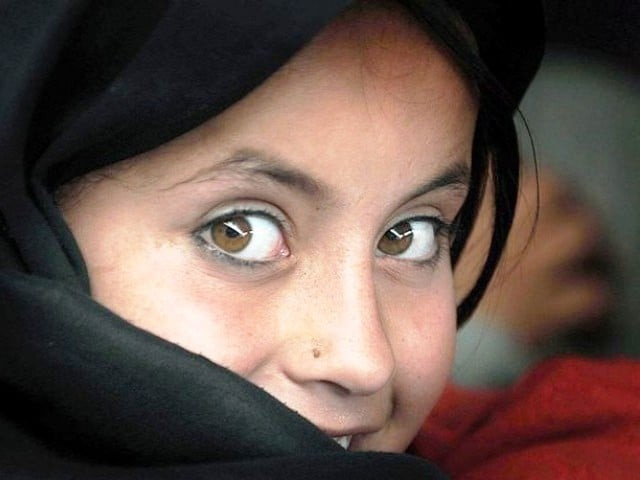The unpaved roads are free from footprints and the un-cemented, unpainted houses bear no signs of the usual rants.
There are no half-naked children jumping into the canal and there are no over-worked women marching about - their dupattas tied to their heads like warrior bandanas.
Perhaps, the only sign of life is the maulvi's exaggerated sermon, which penetrates even the most isolated corners.
As it happens so often in times of such complete devotion to the Almighty, a ‘somebody’ is not prostrating on a prayer mat. A teenage girl is walking towards the bridge, which runs through the canal.
She appears to be 'different'. She has seen less sun and work than the other village-women.
Clad in subdued mustard yellow shalwar kameez, and sporting a veiled head and covered chest, she portrays the very picture of Pakistani piety.
How deceptive looks can be...
Sadori is a part of that breed which the local mullah has decisively dubbed ‘unfaithful.’ A woman who does not pray when she knows how to do so is a black stain on the village, for she has lost her faith and in doing so has lost any chance in Jannat, he says.
Sadori, however, cares little for the word of an old man whose only proof of devotion is an unkempt beard. In fact, she cares very little for anyone except herself.
She has seen things that theses simpletons could never understand. While these pitiful work-women have seen nothing of feminine beauty, Sadori has tasted glamour in its various forms.
While they’ve never had the luxury of looking human let alone female, Sadori has been a lady. Not just a woman, but an arrogant lady.
Her lack of devotion is simply a protest for being forced to live with these people when she rightfully belongs on the other side of the bridge. She belongs with the lords who own the canal, not the peasants who work for them.
Of course, when ten years ago a more fragile little girl had stepped into Begum Abbasi’s room, she wouldn’t have had the gall to think so. All she would have seen then was a helpless little peasant; someone in need of charity.
Who would have thought this innocent soul could be so utterly selfish so as to bite the hand that fed it?
A girl who made forced her way in to a family and then broke it as well.
She lets her mind wander, reflecting on her innocent yet pleasant memories.
-------------------------------------------
“Zahra!” the begum called for her young granddaughter,
The plump, rosy child walked in, her ringlets dangling around the bodice of her lace frock,
“Jee daadi?” (Yes, grandmother)
“This is Marvi,” the begum said pointing at the frail lump on the floor, “take her to play with you.”
Zahra turned to Marvi and smiled her warm, juvenile smile that had won so many hearts before. It won another that day. Zahra’s plump hands encased Marvi’s emaciated ones, and before anyone knew what was happening, Zahra had a new sister.
The waifish child was taken to Zahra’s mother, who couldn’t find it in her heart to turn away a defenseless little orphan.
Together, mother and grandmother decided to bestow a new name on the child along with their charity, and she was renamed “Sadori” a term of endearment for “the good daughter” which had passed through generations of Abbasi daughters. The helpless orphan Marvi became the noble family’s new “Sadori.”
She might have been called Zahra’s equal for anything Zahra was given, Sadori was given as well.
Anything Zahra wore, an identical pair was made for Sadori.
Anywhere Zahra went Sadori had to, and was allowed to, go with her.
Anyone outside the family would have thought that Sadori could share anything Zahra had, but some thngs are just not meant to be shared.
Sadori didn’t think as much.
--------------------------------------------------------------------------
A stone hits her face. She winces and notices the skinny mud-splattered toddler and scowls. Her gaze goes to the canal; it is magnificent and yet artificial.
Artificial, and yet magnificent.
There was once another magnificence in her life- magnificence that was artificial- when she was still welcome on the other side of the bridge.
He really was magnificent, just not hers.
But she could share him, right?
Everything of Zahra's was her's too.
So she helped herself to Zahra's fiance.
What was so wrong about that?
Yet, when that door opened and revealed to the world the shameful couple, another door closed on her permanently.
She vividly remembers Zahra’s tears of hate and a begum from somewhere long past who yelled,
“Get this filthy, ungrateful harlot out of my house!”
So much for equality; the word is a cruel place, she seethes as she jumps off the bridge.
Read more by Ushah here.



COMMENTS
Comments are moderated and generally will be posted if they are on-topic and not abusive.
For more information, please see our Comments FAQ